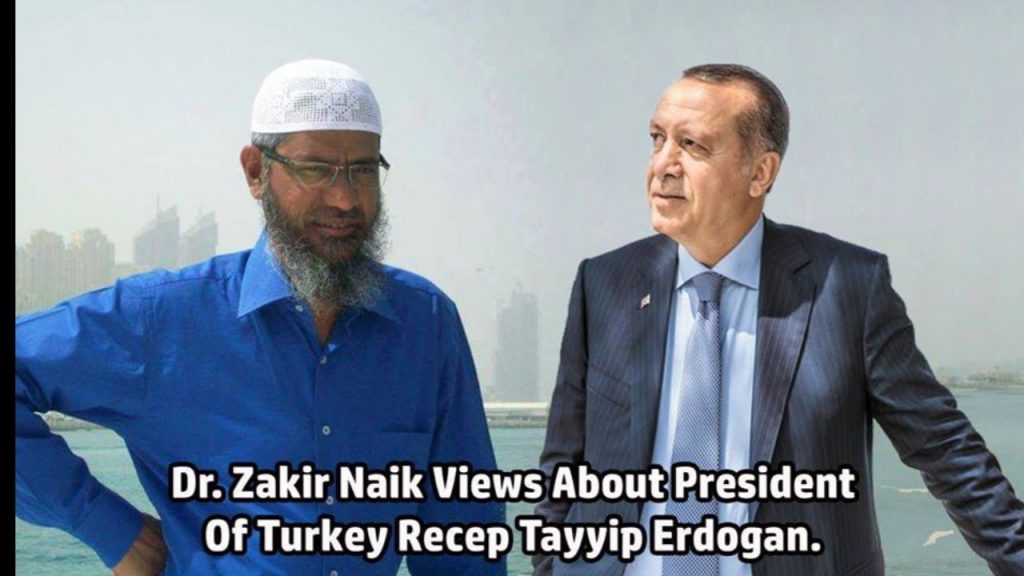Caliph Erdogan? How Turkey’s President is covertly romancing with Indian Muslims
by Abhinav Pandya
Turkey’s president has directed its diplomats to approach prominent clerics, businesspeople and politicians, pointing to specific extremist Islamic clerics … for establishing an Erdogan support base among Indian Muslims.
It is a matter of record that India’s Muslim community is the target of determined efforts towards radicalization.
Is Turkey’s President Recep Tayyip Erdogan attempting to join them?
How credible are reports of alarming outreach activities directed by Erdogan among India’s Muslims? To what extent does the Turkish president harbor ambitions to become the Muslim world’s pre-eminent leader? And how does India fit in to this scenario?
What do I mean when I refer to Erdogan’s Caliphate ambitions? It is a project aimed at fulfilling Erdogan’s ambitions to seize the political leadership of the Muslim world legitimated by consciously assuming the mantle as successor of the glorious history of the Ottoman empire. It is both a religious power play, on the back of his Islamist political roots, and a foreign policy manoeuver bolstering Turkey‘s interests.
There are certainly signs that Erdogan seeks to call on the Ottoman imperial legacy to bolster his standing, justify his aggressive strategic posture in Mideast politics and to legitimate his increasingly authoritarian rule. Earlier this year he explicitly declared that the Republic of Turkey was “a continuation of the Ottoman Empire,” inferring that as its leader, he was analogous to the Caliph.
“Pundits love to talk about “implacable historical confrontation” between Shia Iran and Sunni Saudi. In reality it is the ideological gulf between Saudi Arabia and Turkey, not Iran, that is more deeply rooted. It is about the future of the Middle East,” Commentator Borzou Daragahi quoting Graham E. Fuller in The Geopolitics Of The Khashoggi Murder.
'Pundits love to talk about “implacable historical confrontation” between Shia Iran and Sunni Saudi. In reality it is the ideological gulf between Saudi Arabia and Turkey, not Iran, that is more deeply rooted. It is about the future of the Middle East.' https://t.co/8eqF2Mlkmh
— Borzou Daragahi ?? (@borzou) October 19, 2018
In any contest for leadership, Erdogan’s main obstacle would be Saudi Arabia. Indeed, Erdogan’s Saudi rivals have been quick to accuse him of trying to build a new “Ottoman caliphate.”
That may sound somewhat conspiratorial to those used to seeing the wider Middle East principally as the locus of rivalry between Sunni Saudi Arabia and Shi’a Iran. But that ignores centuries of Ottoman – Wahhabi/ al-Saud rivalry, a tension that spiked most recently in the wake of the Jamal Khashoggi murder.
It was the Ottoman Turks who brought down the first Saudi state in the early 19th century. One hundred years later, the treaty of Serves (1920) ended the caliphate, and Kemalist Turkey became a westernized secular-democracy. However, as is often the case with countries with a glorious imperial past, dreams of political resurrection and irrendentism die hard.
Despite Saudi Arabia being the “Guardian of the Holy Places” of Mecca and Medina, Erdogan’s bid for Muslim leadership has other factors in his favor. His potential popular support is less contaminated by accusations of collaboration with the United States. He is far less obsessed with the geostrategic threat of Iran, and with sectarian Shia-Sunni rivalries in general, and is already engaging with Iran and Qatar.
And despite Turkey’s descent towards becoming an elected dictatorship, its institutions of state are still far more embedded and robust than the non-existent democratic institutions of the Saudi monarchy, which also seems to make it a more attractive model.
It should be noted that part of the discourse around a renewed Caliphate has become part of a dirty tricks and blame game between Erdogan and his public enemy number one, Fethullah Gulen.
Writing for the Gulen-associated “Turkish Minute,” Abdullah Bozkurt suggests that Turkey’s president has directed its diplomats to approach prominent clerics, businesspeople and politicians, pointing to specific extremist Islamic clerics such as Sheikh Salman Nadwi as a main conduit for establishing an Erdogan support base among Indian Muslims. Another anti-Erdogan writer, Aydogan Vatandas, suggests explicitly that the president’s real ambitions are to revive the institution of the caliphate by 2023.
One of the Ulema, Sheikh en-Nedvi form India, on behalf of 300 million Indian Muslims and all Muslim nations, asks People of Turkey to support Erdogan in the upcoming elections..
— Abdurrahman Guc (@gucabdurrahman) May 30, 2018
We will do your wish and do our best to support Erdogan inshallah, ya Sheikh!!
Jazakallah… https://t.co/n9zeHIU84a
Indeed, Indian strategic experts tend to view Erdogan’s initiatives as targeting the influence of the Gulen movement (which focuses on faith-based Islamic education) and rule out the possibility of any larger geopolitical ambitions. But this seems to be a narrow and shortsighted view.
Erdogan has good reason to invest in Indian Muslims. Support from the world’s third largest Muslim population would be a welcome boost to Erdogan’s claim to be the modern-day leader of the Muslim world.
One vehicle set up by a close Erdogan aide appears to have a clear mission to spread the good news of the coming Turkish caliphate specifically among South Asian Muslims.
The South Asia Strategic Research Center (GASAM in Turkish) is a think-tank established by Ali Sahin, a Turkish Islamist who studied in Pakistan who now serves as deputy minister for European Affairs in Erdogan’s cabinet. GASAM organizes conferences to which it invites Muslim clerics, politicians and community leaders from South Asia, to export AKP’s Islamist ideology to Indian Muslims. Sheikh Nadwi’s son Yunus, currently studying in Turkey, is a regular panelist in the conferences organized by GASAM.
The links between Erdogan’s Islamist coterie and Indian clerics are long-standing but also deepening: a number of controversial Turkish Islamist clerics are regular visitors to India; one of them, Sardar Demirel, who was educated in Pakistan, visited Kolkata in 2016 to participate in a protest march against PM Modi’s Uniform Civil Code (a reform measure to bring Muslim divorce laws in line with India’s secular laws).

Credit: YouTube Screenshot.
Concurrently, Turkey has extended a warm welcome to several extremist Indian Muslim preachers, such as Zakir Naik, called “the world’s leading Salafi evangelist,” notorious for inspiring one of the Islamist terrorists who perpetrated Bangladesh’s worst terrorist attack – on a cafe in Dhaka in 2016, in which 24 people were killed; he is currently facing an arrest warrant in India.
Naik delivered a speech at TUGWA (an Islamist group run by Erdogan’s son Bilal) in 2017 and in his speech, available on YouTube with nearly 25,000 views, he declares that Erdogan is the only Muslim ruler who has the guts to support Islam openly: “O Muslim world, wake up…May [Erdogan] be the next ruler of the Muslim world.”skip – Dr about Erdogan | Next Muslim Ruler in the world | Great Message 2017 President ERDOGAN’s Vital Message For Muslim World, “O Muslim world, wake up” “O Muslim world, wake up” . Dr Zakir Naik supported Turkey president. .
Turkish state media, especially international channels such as TRT World, have also been reaching out to Indian Muslims, by playing particularly on alleged Indian abuses in Kashmir, a hot button topic.
Turkey also funds NGOs for outreach among Indian Muslims, Muslim student exchange programs, and influence within madrasas and mosques – not yet on the scale of Erdogan’s initiatives with the Turkish diaspora in Germany and Austria and other EU states, but with the same intention: to ensure an equation between Muslim leadership and the personality of Erdogan.
Indeed, Erdogan’s victory in the presidential elections of June 2018 led to huge celebrations from Kerala to Kashmir. Kashmiri separatist leader Mirwaiz Umar Farookh was among the first to congratulate Erdogan.
How does Erdogan’s strategy fit into the context of India -Turkey relations more generally?
After India’s independence, relations with Turkey were cold at worst, formal at best. Turkey, to India’s discomfort, always took positions on Kashmir that reflected its political proximity to Pakistan.
Turkey’s foreign policy, in recent years, favors Pakistan and China, India’s geopolitical rivals, and hostile to moves cementing a more prominent position for India in international institutions such as the UN Security Council and its long opposition to India joining the Nuclear Suppliers Group, which Ankara lifted only in 2016.
Turkey's President Recep Tayyip Erdogan talks trade with India's Prime Minister Narendra Modi https://t.co/0GHgGYRD6I pic.twitter.com/4Io5a7xmDt
— TRT World (@trtworld) May 1, 2017
Erdogan’s visit to India in April 2017, and the cordial relations between Erdogan and Modi showcased on the sidelines of the recent G20 summit are evidence of some personal chemistry between the two leaders, as well as points of contact between their leadership styles.
However, Turkey’s unfavorable positions on key strategic issues for India remain a hurdle, as is India’s warm relations with Saudi Arabia: veteran Indian diplomat Rakesh Sood has noted, “opening a new page for India -Turkey relations clearly needs to wait for better times.”
What is the likelihood that the Muslim community in India may be susceptible to Erdogan’s charms?
Firstly, Turkey and the vast majority of India’s Muslims, both non-Arab Muslim communities, both follow the same Hanafi school of Sunni Islam. That Hanafi school – in India, the Deobandi and Barelvi traditions –is a built-in advantage for Turkey over Saudi Arabia, whose far more alien Wahhabist Islam faces resistance from local Hanafi schools and India’s indigenous Muslim culture.
Secondly, there’s a tradition of reverence for the Ottoman caliphate. After the revolt of 1857, to escape British persecution, several Indian clerics sought, and were given, refuge in Ottoman territory. In 1919, Gandhi launched the Khilafat movement against the dismemberment of Caliphate by the British, with the massive support of Indian Muslims.
Thirdly, the culture and temperament of Indian Muslims are such that the brutal and extremist methods of an ISIS-style caliphate or Saudi-style Wahhabism has little traction, already proven by the fact that despite boasting the world’s third largest Muslim population, only 112 Indians have traveled abroad to join ISIS.
Ministers in the supposedly secular government openly display majoritarian supremacy. Every other minister is clad in saffron. Journalists and police officers touch the feet of these religious-political figures. And a bunch of Muslims can't pray in a park! Give me a break!
— Shehla Rashid (@Shehla_Rashid) December 26, 2018
U would be in a concentration camps if it would have been China..thanks ur stars for that
— Debasis Sahu ?? (@debasis52) December 26, 2018
Turkey’s moderate version of political Islam, with Erdogan as the leader figure, is more likely to be welcomed by Indian Muslims. As Erdogan ratchets up the authoritarian nature of his rule, owning ever more comfortably the nomenclature of “Sultan,” his aspiration to be recognized beyond Turkey’s borders as a transnational leader of the Muslim world – a Caliph – expands.
And as the Hindu nationalist footprint strengthens in India, and Muslims feel increasingly threatened, they may seek a more powerful backer abroad to protect their interests, rights, security and identity.
Abhinav Pandya, a Cornell University graduate in public affairs, is a policy analyst specializing in counterterrorism, Indian foreign policy and Afghanistan-Pakistan geopolitics. He tweets under @abhinavpandya.


